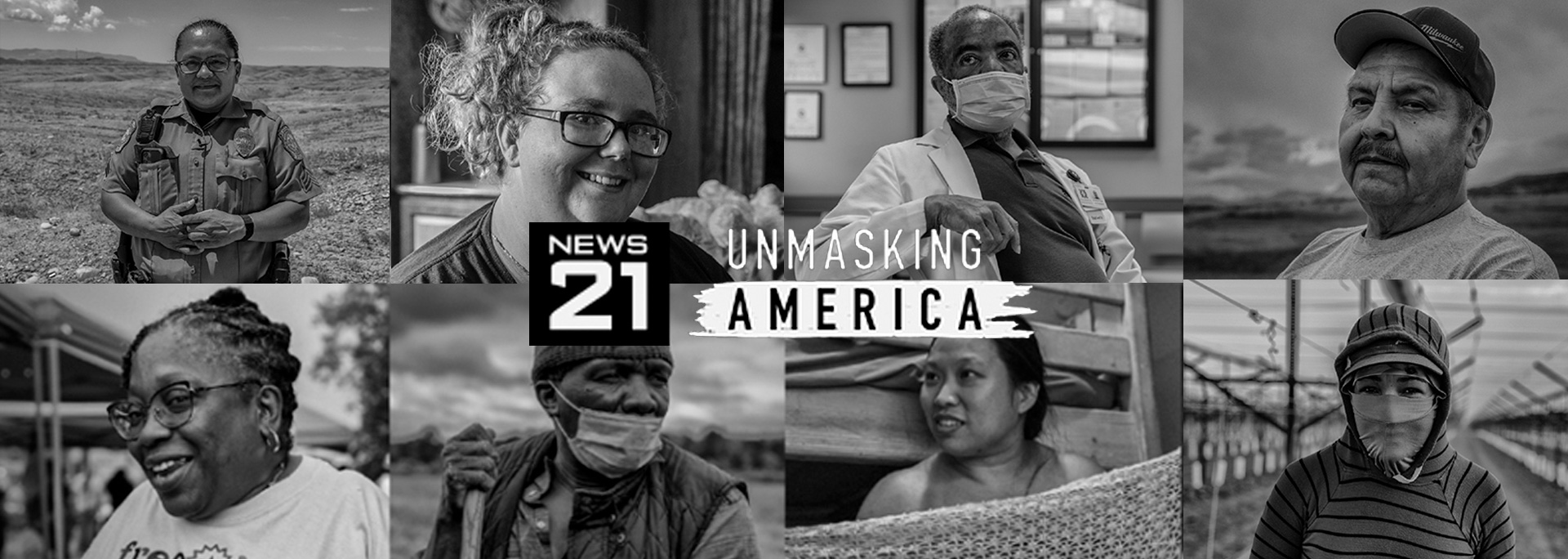The Carnegie-Knight News21 program, a national multi-university reporting initiative headquartered at Arizona State University’s Walter Cronkite School of Journalism and Mass Communication, has released “Unmasking America,” an investigation into the long-term effects of the COVID-19 pandemic.
This year, the fellows traveled to dozens of communities across the country – both rural and urban – to report on how COVID-19 impacted people from different socioeconomic backgrounds. The investigation focused on the pandemic’s effect on immigrant workers, the transition to virtual learning for students, food insecurity, unemployment, federal relief and childcare.
“This year’s News21 project was incredibly timely. Though much has been written about COVID-19, ‘Unmasking America’ highlighted the impact and loss in impoverished communities and magnified decades of injustices and inequities across the country, affecting everything from hunger to housing,” said News21 Executive Editor Jacquee Petchel.
For example, 2.2 million children who were U.S. citizens or legal immigrants did not benefit from the CARES Act stimulus checks because of the immigration status of their parents.
The multimedia package includes 14 main investigative stories, 21 bonus stories with photo illustrations, a four-part podcast and several video stories. Additionally, the team also released a series of portraits of people who gave help or were helped during the pandemic.
Elliott McVeigh, one of nine Cronkite students who reported for the investigation, said he learned not only about others but also about himself.
“The News 21 program really helped me try a little bit of everything and discover where my strengths are and where I need to improve,” McVeigh said. “It also presented an opportunity to see how students from other parts of the country practice journalism and refine my own methods.”
In addition to Petchel, other Cronkite faculty who worked with the students included Managing Editor Venita Hawthorne James; Juan Arredondo, Buffett Visiting Professor of Visual Journalism; Multimedia and Design Editor Alex Lancial and Knight Chair in Data Journalism and former New York Times data editor Sarah Cohen.
News21 launched in 2005 with support from the Carnegie Corporation of New York and the John S. and James L. Knight Foundation to bring in top student journalists from around the country to report and produce in-depth multimedia projects for major news organizations.
In the past decade, News21 projects have investigated juvenile justice, hate in America, drinking water quality, voting rights and post 9-11 veterans, among other topics. The projects have won multiple awards including four Robert F. Kennedy Journalism awards, five EPPY Awards from Editor and Publisher magazine and four Edward R. Murrow student awards.
News21 receives core support from the Knight Foundation and Arizona State University. Individual fellows are generously supported by their universities as well as a variety of foundations, news organizations and individual donors, including the Howard G. Buffett Foundation, Inasmuch Foundation, Myrta J. Pulliam and The Arizona Republic/azcentral.com.
The fellows who reported for News21 are:
- Butler University, Indianapolis, Indiana: Maddy Kline
- DePauw University, Greencastle, Indiana: Ian Brundige and Thomas Curdt
- Elon University, Elon, North Carolina: Mackenzie Wilkes
- Hofstra University, Nassau County, New York: Amudalat Ajasa
- Kent State University, Kent, Ohio: Gina Butkovich
- Quinnipiac University, Hamden Connecticut: Emily DiSalvo and Jessica Simms
- St. Bonaventure University, Allegany, New York: Meghan Hall
- Syracuse University, Syracuse, New York: Domenica Orellana, Amanda Paule and Jessica Ruiz
- University of Alabama, Tuscaloosa, Alabama: Ceara Burden
- University of British Columbia, British Columbia, Canada: Priya Bhat
- University of Colorado-Boulder, Boulder, Colorado: Lauren Irwin, Robert Tann
- University of Houston, Houston Texas: Sara Metz
- University of Nebraska-Lincoln, Lincoln, Nebraska: Kylie Graham, Brenda Maytorena Lara and Natalie Saenz
- University of Oklahoma, Norman, Oklahoma: Zhixuan Fan, Nancy Spears, Beth Wallis and Wendy Weitzel
- University of Tennessee-Knoxville, Knoxville, Tennessee: Ashley Depew
- Walter Cronkite School of Journalism and Mass Communication, Phoenix, Arizona: Jimmy Cloutier, Chase Hunter, Maya Leachman, Elliott McVeigh, Michael Patton, Emily Schmidt, Prince James Story, Zach Van Arsdale and Emma VandenEinde
- West Virginia University, Magnolia County, West Virginia: Maxwell Shavers
John S. and James L. Knight Foundation: The Knight Foundation supports transformational ideas that promote quality journalism, advance media innovation, engage communities and foster the arts. We believe that democracy thrives when people and communities are informed and engaged. For more, visit knightfoundation.org.
Carnegie Corporation of New York: The Carnegie Corporation of New York, which was established by Andrew Carnegie in 1911 “to promote the advancement and diffusion of knowledge and understanding,” is one of the oldest, largest and most influential American grant-making foundations. The foundation makes grants to promote international peace and to advance education and knowledge.
Inasmuch Foundation (formerly Ethics and Excellence in Journalism Foundation): The Inasmuch Foundation, headquartered in Oklahoma City, was founded by Edith Kinney Gaylord, the daughter of Daily Oklahoman Publisher E.K. Gaylord. Ms. Gaylord created the Inasmuch Foundation in 1982 for charitable, scientific and educational purposes.
Howard G. Buffett Foundation: The Howard G. Buffett Foundation has contributed more than $3.4 million to the Cronkite School in support of journalism students and special initiatives. Established in 1999, the foundation is one of the largest private charitable foundations in the United States whose mission is to catalyze transformational change to improve the standard of living and quality of life, particularly for the world’s most impoverished and marginalized populations.
